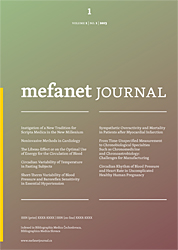
MEFANET Journal 2016; 4(1): 4
EDITORIAL MATERIAL
Preface
Daniel Schwarz
Institute of Biostatistics and Analyses, Faculty of Medicine, Masaryk University, Brno, Czech Republic
schwarz@iba.muni.cz
The Mefanet Journal (MJ) starts its fourth volume with one review article on mobile health technology and five original research articles on the topics of active aging, nursing and psychiatry – all employing different means of technology-enhanced learning: medical simulation, electronic courses, curriculum analysis, and data-driven education. The journal has an interdisciplinary scope, binding together research from different disciplines and providing readers around the world with high quality peer-reviewed articles on a wide variety of topics related to applications of computer science within medical education. Its mission is to become the premier vehicle for disseminating information about MEdical FAculties NETwork (www.mefanet.cz), which covers all Czech and Slovak medical faculties as well as schools or faculties of health care sciences.
The first two papers of this issue deal with active aging. Zanovitová et al. address the problem of helping people remain independent and active in higher age with the use of simulation-based training facilities employed by a university of third age, whereas Komenda et al. grasp the healthy aging problem by means of lectures adapted to various target groups differing in age and with a complex e-learning course delivered through a learning management system. Kuriplachová et al. deal with nursing study programs and show the necessity to promote innovative teaching methods, individual work by students, as well as to react to rapid changes in technology and legislation. The authors back up their claims with an evidence derived from statistical data. Pokorná et al. focus on pressure ulcers and suggest unified reporting of data to be ensured by nurses. For that purpose, the authors present a ready-to-use software tool suitable for data gathering and reporting. Educational components of the presented system are discussed in detail. Hořínková and Barteček report on how education improves medical students’ attitudes to and knowledge of electroconvulsive therapy - an area that is seemingly researched infrequently. The review article by Barrick et al. identifies the potential benefits that mHealth technologies can provide and concerns with some of the risks to privacy. The final editorial material by Komenda et al. recall the most important memories from the last 9th year of the MEFANET conference, which took place in Brno at the end of November 2015. The MEFANET conferences have always been providing a vibrant meeting place for delegates from medical and healthcare faculties, computer scientists as well as medical teachers and students from the Czech Republic, Slovakia and other countries. In 2016, the upcoming 10th year of the MEFANET conference (29–30 November – Brno, Czech Republic) will be focused on technology-enhanced learning and teaching in radiology.
I am sure that the readers will benefit from the information in the presented papers and it is my hope that this issue will stimulate further discussion and additional research. I would like to extend my sincere appreciation to the editorial members and reviewers, without whom this issue would not have been possible. I would like to see the whole fourth volume of MJ as another valuable resource for the MEFANET community and a stimulus for further research into the area of medical education science. Readers are encouraged to submit both comments on these articles as well as their own relevant manuscripts.
July 2016

Daniel Schwarz
Editor-in-chief










